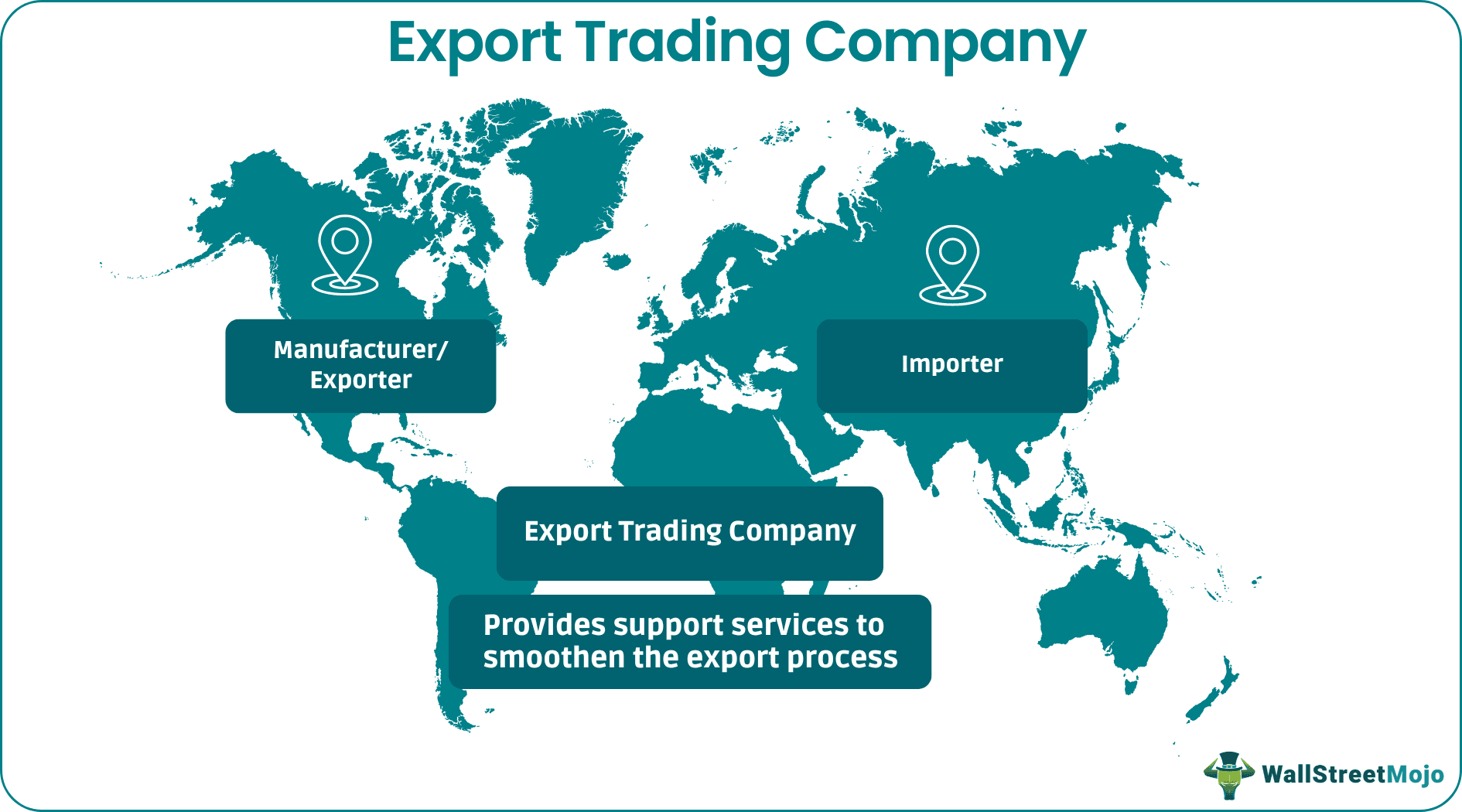Table Of Contents
What Is An Export Trading Company (ETC)?
An Export Trading Company (ETC) is a specialized business entity that provides essential support services to domestic manufacturers and traders looking to expand their market by selling goods to foreign clients or buyers. ETCs oversee the entire export process, including legal compliance, billing, shipping, insurance, warehousing, and more.

ETCs typically earn their revenue through fees or commissions charged to the exporter, usually at a flat rate for their services. These companies can vary in size, ranging from large-sized business entities to small or medium-sized firms, either locally established or situated in a foreign country (the importer's location) where local manufacturers or producers aim to export goods or services.
Key Takeaways
- An Export Trading Company (ETC) is a specialized, independent business organization that provides support services and assistance to local manufacturers and sellers to sell goods in foreign markets.
- The primary objective of ETCs is to help small and medium-sized businesses expand their market and succeed in international trade.
- The various export support services ETCs offer include product sourcing, legal compliance, documentation, billing, insurance, warehousing, shipping, financing, etc.
- An ETC is distinct from an Export Management Company (EMC), which typically acts as a strategic partner or outsourced export department for local businesses.
Export Trading Company Explained
An Export Trading Company (ETC) is an independent firm facilitating international trade by connecting domestic manufacturers or producers with foreign buyers. Its primary goal is to streamline the export process for its clients and provide various services to support their exporting endeavors. ETCs can vary in size and scope, with some specializing in specific industries or regions while others offer a broader range of services with a global reach.
The various functions of an ETC include:
- Export Documentation and Compliance: ETCs assist in preparing and managing all necessary export documentation, such as invoices, shipping documents, and customs forms, while ensuring compliance with international trade regulations and laws.
- Buyer Identification: ETCs leverage their networks and industry contacts to identify suitable buyers or importers for their clients' products. They actively participate in trade shows, exhibitions, and business conferences to establish connections and promote their clients' offerings.
- Negotiation: ETCs negotiate contracts and terms of sale with foreign buyers on their client's behalf. They facilitate discussions on pricing, delivery schedules, payment terms, and other relevant factors to ensure mutually beneficial agreements.
- Logistics and Shipping: ETCs aid in transportation arrangements, customs clearance, and insurance. They collaborate with freight forwarders, shipping lines, and other service providers to ensure smooth and timely delivery of goods.
- Warehousing: These companies arrange for the warehousing and storage of goods when there is a delay in the consignment shipment.
- Billing: Many export trading companies facilitate the invoicing of goods according to the compliance of the importing nation.
- Financing: Some ETCs may offer financing options or assist in securing financing for their clients. They also guide businesses through the complexities of international payment methods to ensure the secure and timely receipt of payments.
Examples
Some of the examples are the following:
Example #1
Suppose XYZ Enterprises is a domestic manufacturer of certain goods based in Singapore. The company approaches ABC ETC for exporting its goods to Australia. ABC ETC is associated with multiple companies in Singapore that supply goods to Australia. Now, ABC ETC connects with the Australian importer of that particular goods and then assists XYZ Enterprises in meeting the legal formalities, documentation, insurance, billing and shipping of the consignment as per the Australian import regulations for exporting the goods.
Example #2
Export Trading Group (ETG) was established in 1967 in Kenya to sell East and Central Africa's locally produced or manufactured goods in foreign markets. It is a big name in the world of ETC, holding expertise in different industries, including logistics, merchandising, agricultural inputs, energy, supply chain optimization and digital transformation. It has a worldwide presence and works to uplift the African farming communities.
Advantages And Disadvantages
An ETC is a critical part of international trade and commerce that connects local sellers to global buyers. However, it also has many drawbacks besides its benefits to global traders. Let us discuss its various pros and cons below:
Advantages
- Expertise: ETCs offer knowledge of foreign markets, cultural differences, and local regulations, helping domestic companies navigate global opportunities and complex international markets.
- Cost Efficiency: They reduce export costs by streamlining export activities and negotiating favorable terms with service providers, saving businesses money.
- Risk Mitigation: ETCs minimize risks like exchange rate fluctuations, political instability, legal compliance, and export regulations through their experience and networks.
- Market Diversification: They guide local businesses to trade internationally, promoting market diversification.
- Time and Resource Savings: ETCs handle the export process, including documentation, warehousing, customs clearance, and logistics, saving businesses time and resources.
- Strong Networks: ETCs have extensive networks in foreign markets, assisting small and medium-sized enterprises with market entry and expansion.
- Financing and Insurance: Some ETCs offer export financing and credit insurance services, boosting businesses' confidence in new markets.
Disadvantages
- Loss of Control: ETCs make decisions on behalf of multiple companies, which can lead to a loss of control over export functions and strategy misalignment.
- Limited Expertise: ETCs may have limited expertise or networks specific to certain regions or industries.
- Risk of Dependence: Relying on ETCs for export functions can be risky if the ETC encounters financial difficulties or management changes.
- Limited Visibility: ETCs may prioritize promoting their brand or collective brands, potentially limiting individual businesses' visibility in foreign markets.
- Conflict and Confidentiality: Working with multiple exporters, including competitors, can raise conflicts and confidentiality concerns when sharing sensitive business information.
- Lack of Customization: ETCs often follow a standard approach, offering limited customization for specific export needs or niche markets.
- Cost Considerations: ETC fees can vary and impact profitability, requiring businesses to evaluate the cost-benefit ratio of ETC services compared to other export options.
Export Trading Company vs Export Management Company
Export Trading Companies (ETCs) and Export Management Companies (EMCs) are distinct entities facilitating international trade, each with its own approach. Some of the prominent differences between ETCs and EMCs are as follows:
| Basis | Export Trading Company (ETC) | Export Management Company (EMC) |
|---|---|---|
| Meaning | Facilitates export activities of multiple businesses by connecting them with foreign markets. | Acts as a strategic partner or outsourced export department for businesses that cannot set up internal export departments. |
| Scope | Primarily focuses on facilitating export transactions and the physical movement of goods in international trade. | Provides comprehensive export management services, including strategic planning and market development. |
| Services | Export support services and assistance, including legal compliance, documentation, billing, insurance, warehousing, shipping, financing, etc. | Market research, export compliance, legal services, product development, international finance, foreign market strategies, logistics, customs and trade compliance. |
| Business Relations | Handles the export functions of multiple business entities collectively. | Establishes close partnerships with individual businesses, acting as dedicated export departments. |
| Customization | Typically follows a standard process for efficient export operations. | Offers more customization to meet each client's specific needs. |
| Sales Function | May have its own sales force to promote and distribute products. | Typically does not engage in direct sales but assists businesses in developing their sales and distribution channels. |
| Handles | Transactional activities | Strategic activities |
| Contractual Agreements | Often short-term | Often long-term |
For professional-grade stock and crypto charts, we recommend TradingView – one of the most trusted platforms among traders.
Disclosure: This article contains affiliate links. If you sign up through these links, we may earn a small commission at no extra cost to you.

Frequently Asked Questions (FAQs)
To start an export trading company, an entrepreneur should first develop a solid business plan, ensuring they have a clear strategy. Next, they should understand and comply with the regulations outlined in the Export Trading Company Act. Finally, they should complete all necessary administrative tasks, such as licensing, banking, and insurance, build a network of international partners, and begin offering support services to clients in their target market.
Congress introduced the Export Trading Company Act (ETCA) of 1982 to promote collaboration among U.S. businesses for more cost-effective and efficient exporting. The Export Trade Certificate of Review is essential for participating companies and is regulated by the U.S. Department of Commerce's Office of Trade and Economic Analysis.
Smaller companies, unable to establish internal export systems, can streamline their export processes, boost export demand, enhance profitability, reduce foreign market risks, and lower export costs by utilizing the support services of ETCs.
